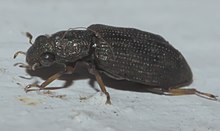| Hydrochus Temporal range:
| |
|---|---|

| |
| Scientific classification | |
| Domain: | Eukaryota |
| Kingdom: | Animalia |
| Phylum: | Arthropoda |
| Class: | Insecta |
| Order: | Coleoptera |
| Infraorder: | Staphyliniformia |
| Superfamily: | Hydrophiloidea |
| Family: | Hydrochidae Thomson, 1859 |
| Genus: | Hydrochus Leach, 1817 |
| Synonyms | |
| |
Hydrochus is the only living genus of beetle in the family Hydrochidae, which belongs to the superfamily Hydrophiloidea, and was formerly treated as a subfamily of Hydrophilidae. Hydrochus includes about 180 species, which are found worldwide.[1] The name "Hydrochus" has also been used for a fly genus in the family Dolichopodidae, but this is a junior subjective synonym of the genus Rhaphium.[2]
They are found in slow moving streams or stagnant water bodies, where they are associated with dense vegetation. In adults air is stored in a bubble on the underside of the body, with the antennae used to transfer atmospheric air to the bubble.[3] The larvae live at the bottom of water bodies, indicating that they can breathe underwater. The diet is only known for the larvae of one species, H. japonicus, which feed on annelid worms belonging the family Naididae. The larvae also burrow into crevices, such as hollow dead grass, including to pupate.[4] The adults are sluggish crawlers along surfaces, and are thought to consume algae and plant detritus. Eggs are laid in silk cases, often attached to (usually plant) substrates.[1]
The club of the seven segmented antennae consists of three segments with a cup-like basal segment. The number of tarsi on the legs are usually 5-5-5 or 4-4-4 (a tiny basal segment can be hard to see). The pronotum narrows towards the rear but is narrower than the base of the elytra. An African species was formerly described under the genus Kiransus, but along with several other African species, it is now placed in Hydrochus.[5] Hydrochids are considered to be an older branch of the Hydrophiloidea. Hydrochids have been suggested as a sister group of the Spercheidae and Hydrophilidae, but the relationships are unclear. Molecular phylogenetic comparisons suggest that they are related as a sister group to Helophorus and Georissus.[6]
The oldest fossil of the modern genus is Hydrochus relictus from the Green River Formation of North America, dating to the Eocene. An extinct genus of the family, Ponohydrochus, is known from the Early Cretaceous (Hauterivian) Khasurty locality in Russia.[7]


- ^ a b Archangelsky, M., Beutel, R. and Komarek, A. 2016. Hydrophiloidea Latreille, 1802: Coleoptera, Beetles. In: Schmidt-Rhaesa, A. ed. Handbook of Zoology Online [online]. Berlin, Boston: De Gruyter. [Accessed 2022-10-02]
- ^ Nomenclatural and Taxonomic Notes on Dolichopodidae Genus-Group Names (Insecta: Diptera) Systema Dipterorum Nomenclatural Notes. I. Edited by Neal L. Evenhuis & Thomas Pape. Bishop Museum Occasional Papers 141: 5–11 (2021).
- ^ Hydrochidae Australian Beetles Volume 2 (2019) CSIRO PUBLISHING
- ^ Hayashi, Masakazu; Morimoto, Ryosuke (March 2022). "Laboratory rearing of Hydrochus japonicus (Coleoptera: Hydrochidae) suggests larvae live at the water bottom". Entomological Science. 25 (1). doi:10.1111/ens.12498. ISSN 1343-8786. S2CID 247170579.
- ^ Hansen, M. (1998). "The systematic status of Kiransus Makhan, 1994, with the description of three new species of Hydrochus Leach, 1817 (Coleoptera: Hydrochidae)". Insect Systematics & Evolution. 29 (2): 223–232. doi:10.1163/187631298x00302.
- ^ Short, Andrew Edward Z.; Fikáček, Martin (2013). "Molecular phylogeny, evolution and classification of the Hydrophilidae (Coleoptera): Classification of the Hydrophilidae". Systematic Entomology. 38 (4): 723–752. doi:10.1111/syen.12024. S2CID 83050858.
- ^ Prokin, A. A.; Strelnikova, O. D. (2021). "The first remarkable fossil Hydrochidae (Coleoptera) from the Lower Cretaceous (Hauterivian) of the Buryatia Republic, Russia". Cretaceous Research. 123: 104795. Bibcode:2021CrRes.12304795P. doi:10.1016/j.cretres.2021.104795. ISSN 0195-6671. S2CID 233957495.